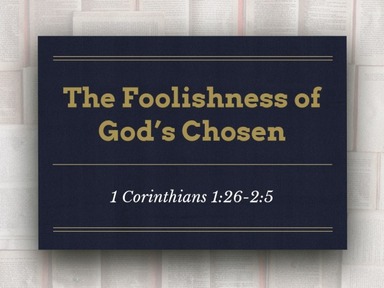The Foolishness of God's Chosen

The Foolishness of God's Chosen
Introduction
Main Truth: We must let God strip away our self-reliance in living and proclaiming the Gospel.
I. God chose the insignificant to save (26-31).
With God choosing the lowly things of this world, Paul completes the reversal of the triad he introduced in v. 26: (1) God chose the foolish over the wise; (2) the weak over the influential; and now (3) the lowly over those of noble birth.
Ironically, honor was the very thing the Corinthians wanted to leach from their powerful and wise leaders. Yet God acts to shame those whom the world regards as impressive. But it is not just a matter of losing face or reputation, as serious as this may have been in Greco-Roman society. Rather, the “shaming” must be understood in the sense of being condemned by God in judgment. The Prophets and Psalms regularly attest to God’s determination to vindicate the righteous and bring the unrighteous to a shameful end (Isa. 41:11; Jer. 2:26; Pss. 6:10; 31:17; 35:4, 26–27; 40:15).
The two verses together leave the unmistakable impression of the deliberate, sovereign action of God in assembling, or “calling,” his people in Corinth contrary to all expectations. God’s choice of the humble nation Israel was likewise surprising and unanticipated: “The LORD your God chose you to be a people for his treasured possession, out of all the peoples who are on the face of the earth. It was not because you were more numerous than any other people” (Deut. 7:7).
Paul’s point is not that none of them amounted to anything, but that, as v. 27 indicates, they are “weak” and “foolish” as far as the world counts power and wisdom. The Corinthian Christians are themselves proof that God’s categories of wisdom and power are not the world’s.
“Righteousness,” therefore, is not so much an ethical term here as it is forensic, and highlights the believer’s undeserved stance of right standing before God, despite his/her guilt from having broken his law.
This is a “religious” metaphor, and in this kind of list it moves us into the ethical sphere. It is a recurring motif in 1 and 2 Thessalonians and is picked up again in 6:11.
The term “redemption” is a metaphor from slavery, and had a rich history among the Jews to express their own deliverance from the bondage of Egypt. The emphasis is more on the deliverance of captives unto freedom than it is on the concept of “ransom” by payment;40 in Pauline usage (e.g., Rom. 3:24; Col. 1:14) it usually refers to deliverance from the bondage of sin.
Righteousness recalls the law court and speaks of vindication and acquittal, holiness brings to mind the temple and being set apart for God, and redemption evokes the slave market and emancipation on the analogy of Israel’s deliverance in the exodus.
Paul insists that God has repudiated the world’s wisdom in choosing people like the Corinthians out of all the inhabitants of the world.74
